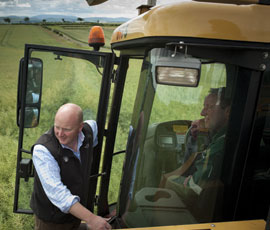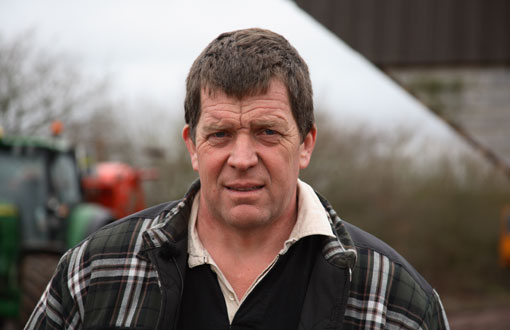Barometer farmers suffer lacklustre yields at harvest

Harvest progress has been slow for our northern and south-western Barometer farmers. Gus Hartley Russell reports
Colin McGregor
Berwickshire
Oilseed rape yields ended up 30% down this year for northern Barometer farmer Colin McGregor with oil contents in the low 40s.
His 574ha crop consisted of DK Expower, Compass and Excalibur and provided an average dry weight yield of 3.7t/ha. This is disappointing against the five-year average of 4.7t/ha.
“This will not be the year to compare varieties.” For the coming season, he has opted for DK Camelot, DK Expower, Compass and Excalibur.
This year’s 660ha rape area has nearly been planted. “We are about 85% completed, it doesn’t take long with two 7m Simba SL700s,” he said.
The drills also apply liquid 20.10.10 NPK fertiliser at 120 litres/ha. “This equates to 25kg/ha of N, but because the fertiliser is placed in a band next to the seed, it’s like applying 40kg/ha,” he added.
A high proportion of the 2013 crop has been established following wheat. “Considering wheat harvest began on 2 September, it is amazing how we have managed to drill 85% of the area (as of 10 September). It’s down to a great team of guys who have put some good work in,” added Mr McGregor.
The 38ha of spring malting barley Belgravia has been combined and part baled. The yields are disappointing. Average yields should be somewhere close to 6.6t/ha, but this year’s average was 5.2t/ha.
“It’s slow going, you wouldn’t mind if you were getting yields of 10t/ha, but we are not.”
Colin McGregor
“Normally we will have finished wheat by the 10 September, but we have still got half to do. The yields are about 30% down on average and the combines are making hard work of it.
“It’s slow going, you wouldn’t mind if you were getting yields of 10t/ha, but we are not,” said Mr McGregor.
A dry week would see the wheat finished and that would leave the 274ha of Fuego spring beans. The beans will be desiccated with Reglone (diquat) prior to harvest.

Steve Lee
Devon
Harvest progress has been slow for south-western Barometer farmer Steve Lee with highly variable yields.
The winter barley area has been cut and ended up between 6.5-7t/ha. “There is not much straw about and the combine has really smashed it up, it’s horrific.
“The intriguing thing is that fields with the same variety, all drilled and sprayed on the same days, have been very variable, some can be very good and some can be awful,” said Mr Lee.
“But anything planted late after grain maize is much better, it has yielded well with a much bolder sample. It is the opposite of what you would expect,” said Mr Lee.
“The winter linseed harvest has been completed with yields about 2t/ha, but until it is sold we won’t really have a true picture of yield. Nothing has been over the weighbridge as yet,” he said.
“Most of the wheat has been harvested at around 18% and there’s been a lot of drying to do, so combining yesterday at 13-14% was a pleasant relief.
“Yields are way down on normal. I think we will be averaging something close to 6.25t/ha. Yields have ranged between 5t/ha and 7t/ha.
“Lear exceeded expectations while the Einstein has been a disappointment. Normally Einstein yields well with a nice bold sample and is the highlight of the harvest, but this year it has been poor,” added Mr Lee.
“Sahara has been a variety that has performed very strongly in places and then, for no reason, it has been rubbish. There doesn’t always seem to be a reason behind it,” he said.
“The spring barley has been very good quality, but with poor yields of about 3.8t/ha. This is without doubt the worst harvest I have seen.”
Steve Lee
Ground conditions have been a worry since the beginning of harvest in Devon. “Conditions are awful, we haven’t had any disasters yet and we have avoided getting the combine stuck,” said Mr Lee.
With regard to cultivation there will be some min tilled and some ploughed, depending on where the crop sits in the rotation. All land that follows grain maize will be ploughed as a matter of course to reduce the risk of fusarium on the following crop.
“Ground that has been min-tilled is drying out really well, much better than I thought,” said Mr Lee.
He has got 120ha of wheat left to cut for himself, as well as 100ha of wheat for his contract cutting customers. This leaves the spring barley and spring beans.
“The spring barley has been very good quality, but with poor yields of about 3.8t/ha. This is without doubt the worst harvest I have seen,” he said.
Grain maize will be the last crop to be combined and, currently, he believes harvest won’t happen until late November.
“It’s a crop that likes a lot of sunshine, with plenty around flowering and it’s had little so far,” he said.
Keep up with the latest harvest developments with Harvest Highlights

